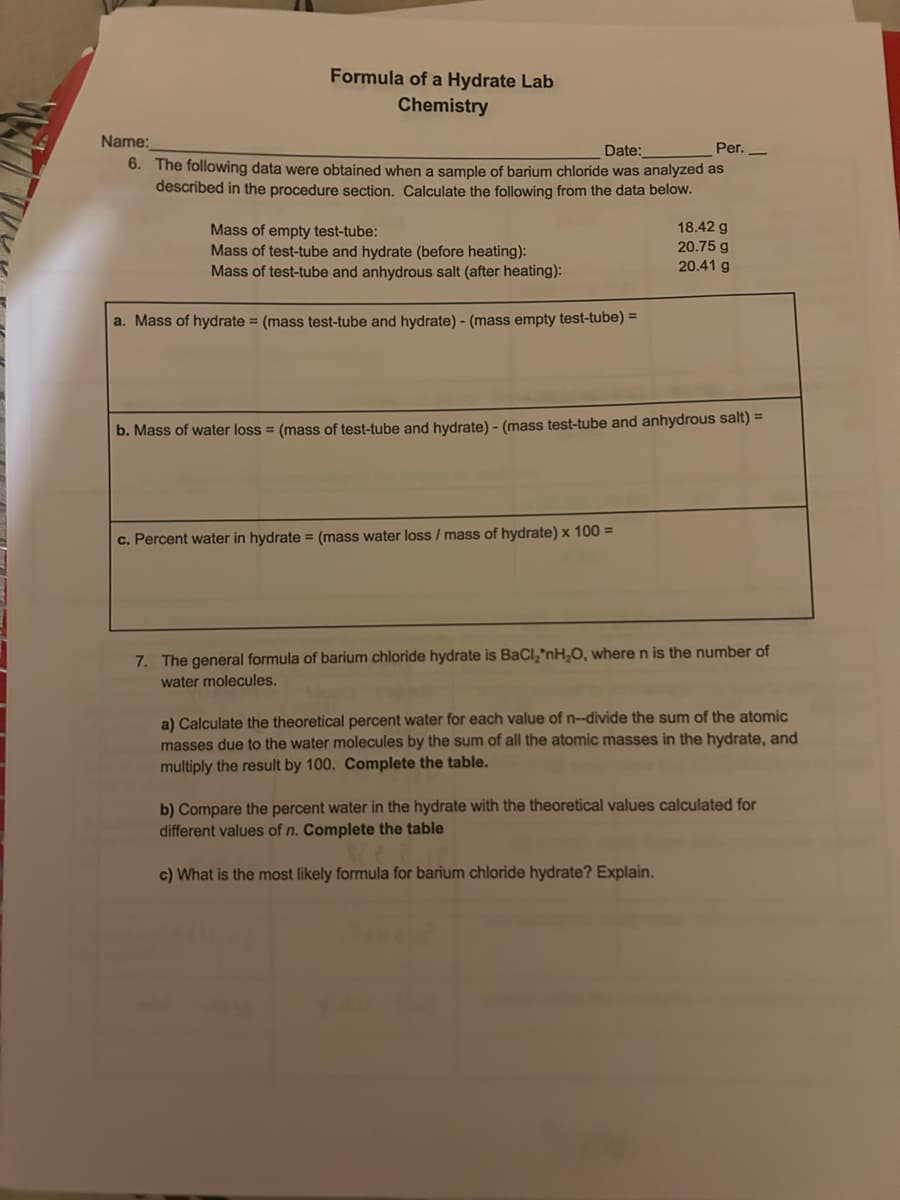Name: Formula of a Hydrate Lab Chemistry Date: Per._ 6. The following data were obtained when a sample of barium chloride was analyzed as described in the procedure section. Calculate the following from the data below. Mass of empty test-tube: Mass of test-tube and hydrate (before heating): Mass of test-tube and anhydrous salt (after heating): a. Mass of hydrate = (mass test-tube and hydrate) - (mass empty test-tube) = 18.42 g 20.75 g 20.41 g b. Mass of water loss = (mass of test-tube and hydrate) - (mass test-tube and anhydrous salt) = c. Percent water in hydrate = (mass water loss / mass of hydrate) x 100 = 7. The general formula of barium chloride hydrate is BaCl₂'nH₂O, where n is the number of water molecules. a) Calculate the theoretical percent water for each value of n--divide the sum of the atomic masses due to the water molecules by the sum of all the atomic masses in the hydrate, and multiply the result by 100. Complete the table. b) Compare the percent water in the hydrate with the theoretical values calculated for different values of n. Complete the table c) What is the most likely formula for barium chloride hydrate? Explain.
Name: Formula of a Hydrate Lab Chemistry Date: Per._ 6. The following data were obtained when a sample of barium chloride was analyzed as described in the procedure section. Calculate the following from the data below. Mass of empty test-tube: Mass of test-tube and hydrate (before heating): Mass of test-tube and anhydrous salt (after heating): a. Mass of hydrate = (mass test-tube and hydrate) - (mass empty test-tube) = 18.42 g 20.75 g 20.41 g b. Mass of water loss = (mass of test-tube and hydrate) - (mass test-tube and anhydrous salt) = c. Percent water in hydrate = (mass water loss / mass of hydrate) x 100 = 7. The general formula of barium chloride hydrate is BaCl₂'nH₂O, where n is the number of water molecules. a) Calculate the theoretical percent water for each value of n--divide the sum of the atomic masses due to the water molecules by the sum of all the atomic masses in the hydrate, and multiply the result by 100. Complete the table. b) Compare the percent water in the hydrate with the theoretical values calculated for different values of n. Complete the table c) What is the most likely formula for barium chloride hydrate? Explain.
Introductory Chemistry: A Foundation
9th Edition
ISBN:9781337399425
Author:Steven S. Zumdahl, Donald J. DeCoste
Publisher:Steven S. Zumdahl, Donald J. DeCoste
Chapter9: Chemical Quantities
Section: Chapter Questions
Problem 100CP: he production capacity for acrylonitrile (C3H3N)in the United States is over 2 billion pounds per...
Related questions
Question
100%

Transcribed Image Text:Name:
Formula of a Hydrate Lab
Chemistry
Date:
Per._
6. The following data were obtained when a sample of barium chloride was analyzed as
described in the procedure section. Calculate the following from the data below.
Mass of empty test-tube:
Mass of test-tube and hydrate (before heating):
Mass of test-tube and anhydrous salt (after heating):
a. Mass of hydrate = (mass test-tube and hydrate) - (mass empty test-tube) =
18.42 g
20.75 g
20.41 g
b. Mass of water loss = (mass of test-tube and hydrate) - (mass test-tube and anhydrous salt) =
c. Percent water in hydrate = (mass water loss / mass of hydrate) x 100 =
7. The general formula of barium chloride hydrate is BaCl₂'nH₂O, where n is the number of
water molecules.
a) Calculate the theoretical percent water for each value of n--divide the sum of the atomic
masses due to the water molecules by the sum of all the atomic masses in the hydrate, and
multiply the result by 100. Complete the table.
b) Compare the percent water in the hydrate with the theoretical values calculated for
different values of n. Complete the table
c) What is the most likely formula for barium chloride hydrate? Explain.
Expert Solution
This question has been solved!
Explore an expertly crafted, step-by-step solution for a thorough understanding of key concepts.
Step by step
Solved in 2 steps

Recommended textbooks for you

Introductory Chemistry: A Foundation
Chemistry
ISBN:
9781337399425
Author:
Steven S. Zumdahl, Donald J. DeCoste
Publisher:
Cengage Learning

EBK A SMALL SCALE APPROACH TO ORGANIC L
Chemistry
ISBN:
9781305446021
Author:
Lampman
Publisher:
CENGAGE LEARNING - CONSIGNMENT

Introductory Chemistry: An Active Learning Approa…
Chemistry
ISBN:
9781305079250
Author:
Mark S. Cracolice, Ed Peters
Publisher:
Cengage Learning

Introductory Chemistry: A Foundation
Chemistry
ISBN:
9781337399425
Author:
Steven S. Zumdahl, Donald J. DeCoste
Publisher:
Cengage Learning

EBK A SMALL SCALE APPROACH TO ORGANIC L
Chemistry
ISBN:
9781305446021
Author:
Lampman
Publisher:
CENGAGE LEARNING - CONSIGNMENT

Introductory Chemistry: An Active Learning Approa…
Chemistry
ISBN:
9781305079250
Author:
Mark S. Cracolice, Ed Peters
Publisher:
Cengage Learning